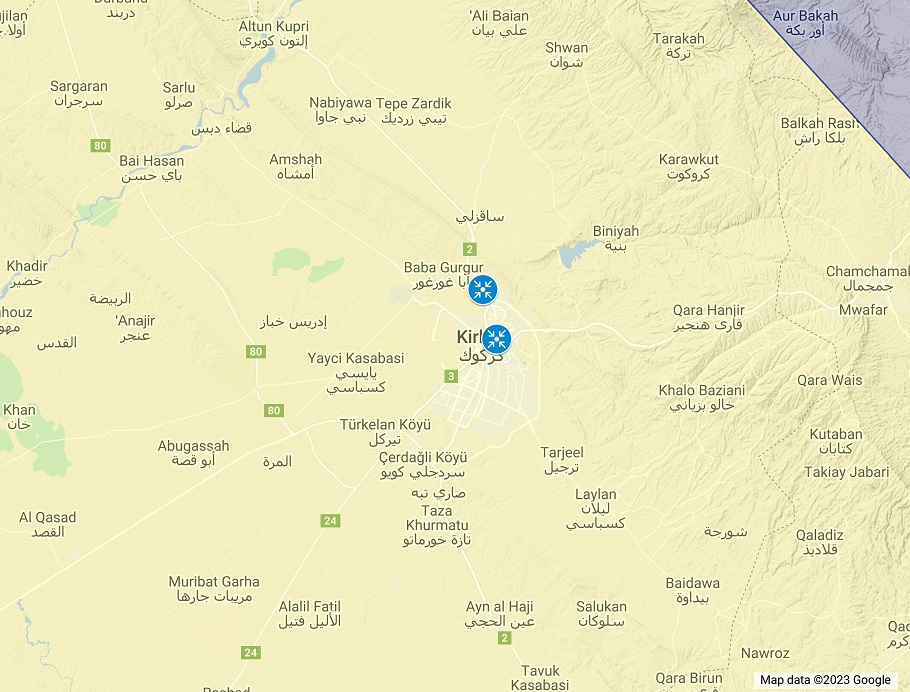A biweekly brief of events and news occurred in the disputed territories.
Kirkuk
On August 27th, the Iran-backed Asaib Ahl Al-Haq militia group alongside a group of Sunni Arabs, led by militia leader Wasfi al-Asi organized a protest outside the Kurdistan Democratic Party (KDP) headquarters in Kirkuk, which has been occupied by Shiite militias and other Iraqi forces since the events of October 16, 2017. The “protests” were initiated shortly after KDP officials announced their intention to return to Kirkuk. The chauvinist group expressed their opposition to the KDP’s return to the city by erecting tents and blocking the main road leading from Kirkuk to Erbil, resulting in traffic congestion and disruptions in movement. Asaib Ahl-Al Haq later withdrew their forces but continued their support for al-Asi’s group. A joint statement from the Turkey-backed Iraqi Turkmen Front and the Arab Coalition of Kirkuk, with support from Kirkuk’s acting governor, rejected the KDP’s return to their headquarters.
The protests gained momentum as they became part of a pre-election strategy by Arab and Turkmen parties amidst significant internal divisions to reduce Kurdish votes. Al-Asi accused other Arab and Turkmen parties of agreeing to the KDP’s return. On September 2nd, several Sunni Arab rivals refuted al Asi’s claims, and the Turkmen Front threatened him with a lawsuit for what they claim are unsubstantiated remarks.
The protests persisted, with the Kurdish community interpreting them as a provocation, especially since many of the “protesters” are former members of the Ba’ath party, who were attempting to belittle the Kurdish nation. Iraqi Prime Minister Mohammed Shia al-Sudani promised to hand over the occupied headquarters to the KDP by September 4.
On the evening of September 2nd, after five days of traffic congestion and road blockages by the chauvinist protestors, Kurds staged counter protests, demanding the reopening of the road and an end to the racist provocations. However, security forces, primarily the Iraqi army, were swiftly deployed and opened fire against the Kurdish protesters, resulting in 4 Kurdish fatalities and 16 injuries. Following these attacks, senior Iraqi military officials arrived in Kirkuk and ordered further crackdowns arresting numerous Kurdish protesters and conducting raids on Kurdish homes, clearly aligning with the Arab protestors who were backed by Asaib Ahl al-Haq and al-Asi’s Baathists.
Iraqi Prime Minister, al-Sudani, engaged in phone calls with Kurdish leadership, emphasizing “the necessity for the security forces to enforce the law to maintain social peace and the normal life of the province’s residents.” Subsequently, a 24-hour curfew was imposed on the city. The Kurdish counter-protests persisted until Monday, September 4th with calls for justice and an end to the martial law which has been imposed on the province since October 16, 2017.
The next day, a security emergency was declared in Kurdish neighborhoods, including Rahimawah and Sarchnar. Iraqi forces swiftly entered these areas, conducting house-to-house searches. Moreover, on September 3, the Supreme Court promptly ruled against the return of the KDP’s headquarters, citing alleged “illegal construction.” This decision drew strong criticism from the KRG’s Prime Minister.
On September 4, a demonstration took place in the Rahima neighborhood, protesting the militarization of Kirkuk by the army. The protest led to clashes between demonstrators and the army, lasting late into the night. On September 5, the Turkish-backed Turkmen Front issued a statement, urging Kirkuk politicians to unite for the sake of the city. Additionally, on September 6, Kurdish parties accused the Iraqi army of supporting Arabs and attacking Kurds, demanding an end to the military situation in Kirkuk.
Following calls on social media, a demonstration was planned in front of Kirkuk Castle on September 7. Approximately 7,000 police officers, standby police, emergency police, two battalions from the 11th Division of the Iraqi army, Special Forces (Meghwir), and National Security Forces were deployed in the vicinity. They blocked roads and made random arrests to deter the protests and instill fear among citizens.
Decisions by the Iranian-backed government
Prime Minister Mohammed Shia Sudani’s scheduled visit to Kirkuk on September 9 was postponed. Instead, the “State Administration Coalition,” which formed the cabinet, convened in Baghdad to address the situation in Kirkuk. Iraqi President Latif Rashid and Speaker Mohammed al Halbousi participated in the meeting. They subsequently issued a statement emphasizing the need to “enhance security and stability” and “prioritize the greater interests of the people.”
Iranian and Turkish reactions to the Kirkuk events
In an attempt to maintain the appearance of “neutrality” and conceal their intentions regarding the Kurds, Iran’s spokesperson for the Foreign Affairs Ministry, Nasser Kanaani, stated, “We do not interfere in Iraq’s internal affairs” while expressing willingness to assist if requested. This stance came despite Iran’s main proxy, Asaib Ahl al Haq, being involved in the protests.
Meanwhile, in response to the deaths of Kurdish protesters, Turkey’s Ministry of Foreign Affairs, represented by Hakan Fidan, referred to Kirkuk as the “ancestral homeland of our Turkmen kin.” Turkey holds significant influence over Iraq and employs it to counter further Kurdish political advances. In 2005, the Turkish government dispatched an assassination team to target the Kurdish governor of the province, which was subsequently apprehended by US forces.
Additionally, Turkey’s President, Recep Tayyip Erdogan, has intervened, asserting that Kirkuk “is the home of the Turkmen.” As of September 13, some security forces have withdrawn from the streets, but numerous military vehicles and troops remain stationed in Kurdish neighborhoods.

